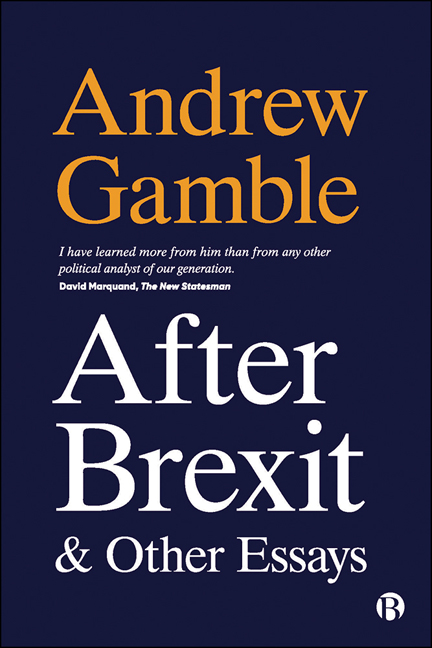Book contents
- Frontmatter
- Dedication
- Contents
- Preface
- Introduction: Historical Contexts
- Notes on the Essays
- 1 After Brexit (2019)
- 2 Explanations of British Decline (1999)
- 3 The European Disunion (2006)
- 4 The Anglo–American World View (2019)
- 5 The Free Economy and the Strong State (1979)
- 6 Thatcherism and Conservative Politics (1983)
- 7 Economic Growth and Political Dilemmas (1983)
- 8 The Crisis of Conservatism (1995)
- 9 The Thatcher Myth (2015)
- 10 Theories of British Politics (1990)
- 11 The Constitutional Revolution in the United Kingdom (2006)
- 12 What’s British about British Politics? (2016)
- Epilogue: Last Thoughts
- Notes
- Acknowledgements
- Index
9 - The Thatcher Myth (2015)
Published online by Cambridge University Press: 22 December 2021
- Frontmatter
- Dedication
- Contents
- Preface
- Introduction: Historical Contexts
- Notes on the Essays
- 1 After Brexit (2019)
- 2 Explanations of British Decline (1999)
- 3 The European Disunion (2006)
- 4 The Anglo–American World View (2019)
- 5 The Free Economy and the Strong State (1979)
- 6 Thatcherism and Conservative Politics (1983)
- 7 Economic Growth and Political Dilemmas (1983)
- 8 The Crisis of Conservatism (1995)
- 9 The Thatcher Myth (2015)
- 10 Theories of British Politics (1990)
- 11 The Constitutional Revolution in the United Kingdom (2006)
- 12 What’s British about British Politics? (2016)
- Epilogue: Last Thoughts
- Notes
- Acknowledgements
- Index
Summary
When Margaret Thatcher died on 8 April 2013 it was more than twenty-two years since she had been ousted as Prime Minister in December 1990. She had been ill for a long time and although she made occasional appearances in public she had ceased public speaking and took no active part in politics. In the time that had elapsed since she was Prime Minister a new generation of politicians had taken charge and the Thatcher decade had begun to seem a distant memory. Yet no sooner was her death announced than for ten extraordinary days Britain was plunged back into that decade. The passions of that era were suddenly reawakened, and many of the same battles were fought out again through the media. It is hard to think of any other British politician in the last hundred years who has excited such extremes of adulation and hostility. Conservative newspapers like The Daily Telegraph and Daily Mail carried full-page, softly lit portraits of Thatcher treating her as some kind of saint, while at the other extreme there were endless requests for Judy Garland singing ‘Ding dong the witch is dead’. In an era of anti-politics and disdain for politicians Thatcher remains an exception. She still divides opinion. She manages to evoke huge loyalty and adoration in one part of the British public, huge dislike and fury in another. There is little middle ground.
This divisiveness was inherent in her style. The words of St Francis she quoted on the steps of Downing Street in 1979 were almost the exact opposite of how she intended to govern, and for the most part did govern. She scorned consensus and saw the world in stark oppositional terms, dividing everyone into friends and enemies. Typical of her approach was her enquiry, ‘Is he one of us?’, her insistence that since the other side had an ideology the Conservatives must have one as well, and her characterisation of militant trade unionists as ‘the enemy within’. Her fierce opinions and her unwillingness to compromise were what enraptured and captivated her admirers and what so infuriated and nauseated her opponents.
- Type
- Chapter
- Information
- After Brexit and Other Essays , pp. 177 - 192Publisher: Bristol University PressPrint publication year: 2021



